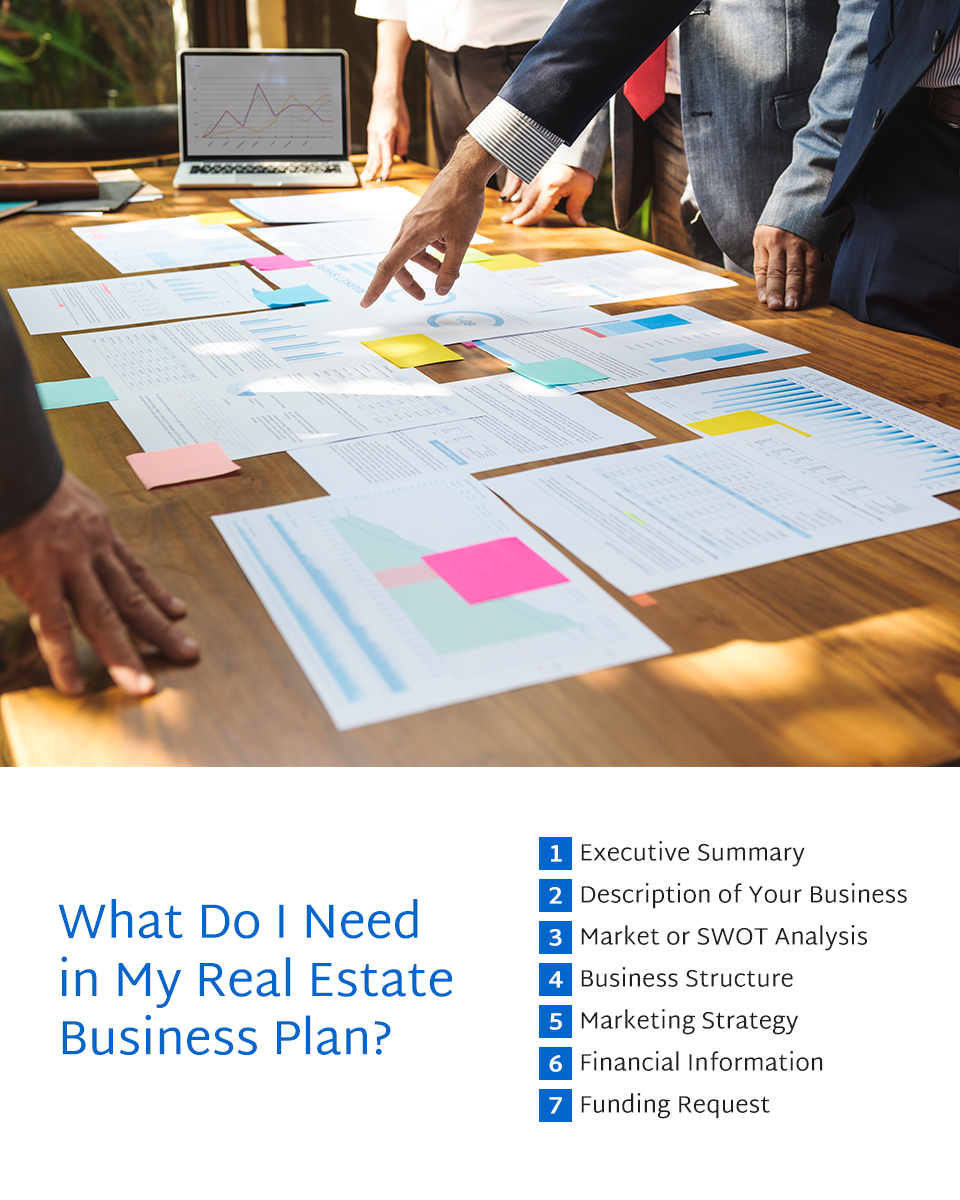How to Create a Real Estate Business Plan
If you want to succeed in the real estate business, it pays to have a plan. A business plan can be valuable whether you are just figuring out how to start your own real estate company or have been in the industry for a while. You can use your plan to reach your goals, such as attracting more investors or expanding into a new region.
Writing a business plan can seem like a substantial undertaking. If you break down the process and the plan into smaller pieces, you’ll be on your way. After creating the plan, it’s a good idea to review it from time to time to make sure it still aligns with your mission and goals.
Why Do I Need a Real Estate Business Plan?
A business plan might seem like an unnecessary extra step to take when you’re starting a real estate company or looking to grow an existing company. In reality, developing a real estate business plan allows you to accomplish several tasks.
A clear plan helps to guide your company as it gets off of the ground and as it moves through growth phases. If you have questions about what steps to take next or where to steer your business, you can refer to your plan for guidance. Another reason to create a real estate investment business plan is that it can help you get financing.
In your business plan, you should set up goalposts or milestones to achieve. As your company grows, you can look back on your plan to make sure you are on track to your goals. You might also refer to your plan to remind yourself of what your goals are. If you have a decision to make, such as whether to hire a new employee or purchase a piece of property, you can look at your business plan and evaluate whether or not your next move aligns with what’s in the plan.
When you are trying to win over investors or are trying to get a loan from a financial institution, a business plan can help, too. Your plan can show potential funders that your business is on track and viable. It can demonstrate proof-of-concept and reassure investors that they will see a return. The plan can reassure financial institutions that you’ll be able to repay the loan.
What Do I Need in My Real Estate Business Plan?
Since every company is different, no two real estate business plans are identical. A structure or layout that works for one company might not be appropriate for another. The most important thing to consider when putting together your plan is your overall goals and your company’s needs.

While there’s no “right” or “wrong” business plan, there are several components you are likely to see in every plan. Most business plans typically have the following sections.
1. Executive Summary
You can think of the executive summary as an overview or introduction. In the executive summary, you describe the content of the business plan, giving a reader an idea of what to expect.
The executive summary should be short, but that doesn’t mean it should be fluffy. It needs to convince the reader to continue with the business plan. It should contain your company’s mission statement, describe your product, explain who your target market is and introduce your leadership team. If your company has existed for some time already, the executive summary can recap any successes or achievements.
One of the more challenging aspects of the executive summary might be figuring out what your business’ mission statement is. Your real estate company’s mission is its “why” or reason for existence. Some things to consider as you put together the mission statement are:
- Who your current or intended customers are
- Why a customer would choose your business
- What your customer needs
- Why you decided to go into real estate
- What you see your company doing in or for the real estate industry
2. Description of Your Business
Once you’ve grabbed your reader’s attention with the executive summary, it’s time to launch into a more detailed description of your company. Your company description should include:
- Who your company is: Tell the reader who’s behind your company, its location, its name and what type of business structure it has. Also, include who’s who on the management team of your company. It’s also a good idea to include a brief description of the people you either currently employ or anticipate employing at a later date, such as real estate agents, office managers and developers. If you have a hot-shot or big name on your leadership team, be sure to highlight that in your company’s description.
- The history of your company: Give the reader a bit of background information about your business. When did you get started, and what made you decide to start the company? The more engaging and personable you can make your company history, the better.
- What makes your company different from the rest: What’s your company’s unique selling point (USP)? Outline it and describe it in the business description section of your plan.
- What your company does all day: It’s also a good idea to discuss your company’s day-to-day operations in the description. Give the reader a peek behind the scenes, such as when your company will be open, when team members are available and how you handle any illnesses or time-off.
3. Market or SWOT Analysis
How does your real estate company compare to others? What do other companies have that yours doesn’t, or what does your company have that your competitors lack? The market analysis section will let a reader know what you’re bringing to the table. The market analysis often contains a strengths, weaknesses, opportunities and threats (SWOT) analysis.
- Strengths: The strengths of your business are the things you do well or the advantages you have that competitors don’t. For example, you might be able to offer the lowest price on a service, or you might have real estate agents who have the most experience in the industry. Think of your strengths as the things people will mention when they review your business or recommend you to other clients.
- Weaknesses: Weaknesses are the areas where your company has room for improvement. Maybe you’re new to real estate and don’t have as much experience as others in the industry. It could be that you’ve recently moved into a particular region and aren’t as familiar with that area. Along with outlining a few weaknesses in your SWOT analysis, focus on what you can do to strengthen or improve them.
- Opportunities: Opportunities are areas where your business has a chance to grow. For example, you might operate in an area that is attracting a lot of millennial buyers. There might be condos in your area that are proving attractive to empty-nesters and people looking to downsize. Along with identifying business opportunities, include a few examples of how your company plans on taking advantage of them.
- Threats: Threats are any obstacles or challenges your company might face as it grows. A threat can come from inside the company, such as your best people leaving and opening up their own shops. They can also be external, such as the real estate market taking a dip or an influx of similar companies into the area. Once you’ve identified potential threats, detail what you will do to combat them.
4. Business Structure
You should mention your company structure and management team in the section describing your business. It’s also a good idea to create a separate section in your plan to go more in-depth into the subject. One place to start is by describing the legal structure of your company. Are you a sole proprietor or a limited liability company (LLC)? Have you already incorporated, or do you plan on doing so at some point?

The business structure section of your plan is a good place to detail the who’s who of your company. You might want to create and include an organizational chart. Include the names of your management team and their titles. Add in a bio of each major player, outlining where they have been, what they’ve achieved and what they can do for your business. You might want to attach the CVs or resumes of each member of your management team as an appendix to your business plan.
5. Marketing Strategy
Identifying your business is just one part of your business plan. Outlining your marketing strategy is another critical component. In the marketing strategy section of your real estate business plan, describe how you’ll attract clients, how you’ll manage your customers and how you’ll get the word out about your company. Some of the things to discuss in the marketing strategy section include:
- Customer management: How will you find clients? Think of ways to come up with leads and how you’ll nurture those leads. You might collect names at home shows, have first-time homebuyer seminars or list your experts on a website.
- Marketing campaign ideas: How will you reach clients? You might send out emails, list your properties on certain websites, hold open houses and set up social media profiles.
- USP: What will your company do to set itself apart from other real estate companies? Do you provide a service no one else offers? Do you offer a referral bonus or a discount of some sort?
6. Financial Information
Whether you are in the process of learning how to form a real estate company or have an established business, you want to include financial details in your business plan. The financial information section should consist of a list of your actual or expected expenses, such as office space, marketing costs and employee salaries. It should also include actual or projected cash flow, sources of funding and a list of debts, if any.
7. Funding Request
The last section of your real estate business plan is optional. If you are using your business plan to attract investors or lenders, you should include a request for funds at some point. Outline what you are looking for and how you’ll use the funding. For example, you might need start-up financing if your company is new. If your business is established, you might be looking for funding to hire new team members or to open a new office.
Along with making the ask in this section, it’s also important to outline what the investor or lender will get out of it. How much of a stake in your company can you offer investors? How will you pay back any money you borrow from a financial institution?
How Do I Write the Business Plan?

If writing a business plan for your real estate company seems like something easier said than done, don’t worry. Here are a few tips to help you through the process:
- Do your research first: Know your business, know your market and know what makes your business different from what’s out there. Have some hard stats and figures to back up any claims you make in your business plan. You also want to research the competition so you can figure out what to offer to set yourself apart.
- Focus on goals: Before you start writing the plan, make a list of goals. Don’t worry if some of the goals are grand or seem impossible to achieve. Knowing what you’re working toward will help you figure out how to stay on track and what your business needs to do to get there.
- Keep things realistic: Have a practical grasp of what you can do on your own, what you’ll need to hire someone else to do and how many people you’ll need on your team.
- Consider writing the executive summary last: Your teachers might have recommended writing the introduction last when you were in school. Similarly, it’s often a good idea to save the executive summary for last when writing a business plan. That way, you have a better sense of what your goals are, why your company exists and who it is.
- Use a template: Lots of business plan templates exist. Using one can make the process of organizing your thoughts and creating your plan a lot easier.
- Remember, nothing’s permanent: You can go back and change any part of your business plan at any time. The plan you create at that the start of your company might not be valuable or relevant at the end of your first year. Think of your business plan as a living document that will change as your company’s needs change. Approaching the writing process with that in mind can help you feel more relaxed.
Tips for Starting a Real Estate Company Business Plan
One of the most important things to remember as you start to develop your business plan is what you hope to get out of it. Having that end goal in mind will help you create a plan that guides you toward it. It’s also important to remember to clearly state what you want and are working toward at the start of the plan. People reading your plan shouldn’t have to guess at what you want. It’s up to you to make that point abundantly clear.
As you get started, think of the person you’re writing the plan for. Are you trying to attract investors, or do you want a loan from a bank? Do you want to use your business plan to convince clients to work with your company? Knowing your audience will help guide you through the rest of the writing process.
Grow Your Real Estate Business With an Expert Accounting Firm
With a business plan in place, your real estate company is ready to take the next step and work toward growth. But a business plan isn’t the only thing you need for your company’s financial health and future growth. You also need efficient and cost-effective accounting and CFO services. Companies that experience the highest levels of success have a strong financial backbone, with plans in place for strategic and sustainable growth.
Pasaban Accounting Solutions works exclusively with companies in the real estate industry, including developers, construction firms and property managers. Our services range from bookkeeping to strategic planning. We offer our clients cloud-based services to increase efficiency while keeping costs down. To learn more about how we can improve your company’s financial organization to help it reach its goals, contact us today.


